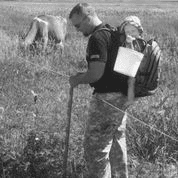Young and Beginning Farmers Plant Roots of Sustainability and Community
By Elizabeth Wolf, Communications and Development Director
Over the past century, the total number of American farmers has plummeted to less than 1% of the U.S. population. For each individual farmer under the age of 35, there are six over 65. And while the average age of an American farmer is 57, it is just 34 for organic growers. Over the next 20 years, 70% of the nation’s farmland will change hands.

“The question is, who is going to take over that land?” asks Lindsey Lusher Shute, director and co-founder of the National Young Farmers Coalition (NYFC). Will it be corporate ag and urban developers? Or will a new generation of farmers take back the land to renew American agriculture?
The good food movement is inspiring many young people, both from farming and non-farming backgrounds, to choose a career in agriculture. These farmers have the potential to offset the numbers of retiring farmers and keep family farms active, but barriers to entry are steep.
In a survey of 1,000 farmers across the U.S., the NYFC found the top two challenges were lack of capital and access to land.
When Zoë Bradbury was denied credit by the USDA’s Farm Service Agency, the Oregon farmer financed her first season farming with a credit card. Thanks to a good growing season, she was able to pay it off before the 18.9% interest rate kicked in.
NYFC president William Powers, 31, dreamed of inheriting his grandfather’s farm in Ohio. It didn’t happen. So he and his wife Crystal, an extension engineer for the University of Nebraska, went loan hunting.
“The loan officers didn’t know what to do with us because we wanted to have a grass-fed dairy,” says Powers, who is also the director of the Nebraska Sustainable Agriculture Society (HealthyFarms.org). “Apparently it’s simpler to have a feedlot, or raise corn and soy,” Powers says. The couple has owned Darby Springs Farm, in southeastern Nebraska, since 2009.
The cost and availability of farmland to lease or purchase are also major challenges for aspiring farmers, many of them saddled with student loans. Between 2000 and 2011, national per-acre farmland values doubled.
“Land is crazy expensive,” Lindsey Shute found when it took her husband, Benjamin, and her ten years to buy land in New York state, where they now own Hearty Roots Community Farm. The 25-acre farm produces vegetables and eggs for a 600-member CSA serving the Hudson River Valley and New York City.
William Powers saw irrigated cropland go for $24,000 an acre at auction in Iowa last year. Astronomical land prices mean large farms get larger; non-ag investors push values even higher. Corporate control over food and agricultural production has intensified: out of a total of less than 3 million farmers, a little over 190,000 of them produce 75% of our food.
“The structural environment we as farmers are working in today is essentially the same one that’s been driving farmers out of business for decades,” Shute explains.
Encountering these types of challenges led the Shutes and colleague Severine V.T. Fleming to found the National Young Farmers Coalition in 2010 (YoungFarmers.org). The membership-based organization is dedicated to the success of the next generation of American farmers. The national hub provides technical assistance, policy work, and advocacy while cultivating a network of state/regional chapters to encourage local community building.
There are 15 chapters so far. Farmers in the Hudson Valley formed a cooperative buying club to bring down the exorbitant cost of non-GMO and organic animal feed, trucked in from the Midwest. Now, more of the area’s farmers can offer meat, dairy and eggs to their markets.
Collaboration also fuels NYFC’s Farm Hack project. A community of farmers, engineers, programmers, designers and other allies, Farm Hack develops open source technology and tools to help solve farmers’ problems in the shop and in the field. The project ditches mainstream ag’s top-down, chemical-intensive inventions for solutions that fit the scale and ethics of sustainable farms.
NYFC successfully influenced the USDA’s Farm Service Agency to develop a microlending program for beginning farmers. Currently they’re lobbying for the Beginning Farmer and Rancher Opportunity Act of 2013. NYFC is, Shute says, “doing what we can to create a permanent home for independent, sustainable, diversified and organic farmers in the U.S.”
Their goal? A million new farmers.

